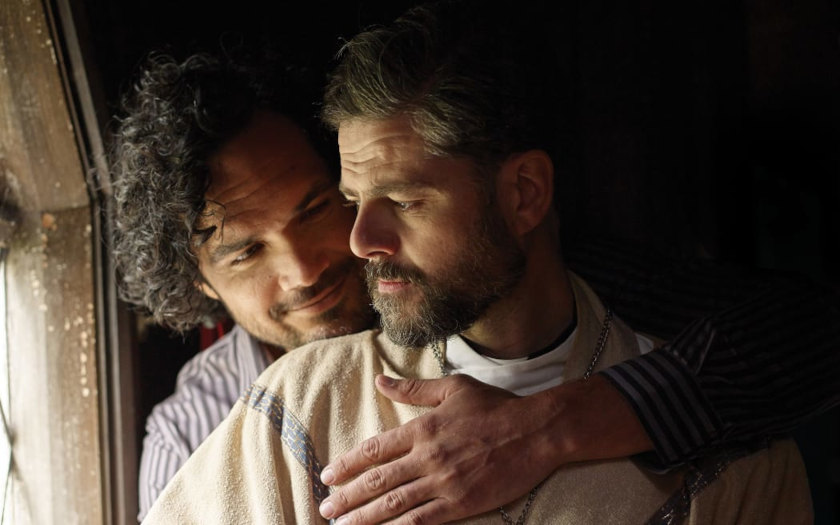Vassilis Kroustallis reviews the New Zealand-set film and LGBTIQ+ drama 'Mysterious Ways' by Paul Oremland.
'Mysterious Ways' starts with a kiss between Peter (Richard Short of 'Tragedy of Macbeth') and the Samoan Jason (newcomer Nick Afoa). This will be one of the few intimate scenes in Paul Oremland's lucid film of LGBTIQ+ church politics, in which both parties (an interracial relationship, nevertheless) have to confront themselves before confronting the others.
The film starts where another film would have ended, namely with the openly gay vicar of an Anglican church in New Zealand. Handsome and masculine Peter is both an example to his parish (he runs along with his partner) the youth club, a radio DJ local celebrity, and a father blessed with the love of his daughter (Becky McEwan) -from his previous marriage to a woman, now dead. It seems that this happiness could last forever -only if Peter hadn't wanted to officiate his marriage (via a radio proposal) to his partner at a church wedding. This is something that the Anglican Church, which he serves, and his bishop representative (a delightfully stern Michael Hurst) firmly denies -accusing him of 'pride' in the process. A blessing would be fine, but never a church wedding.
Whereas the usual narrative course from here would be for a film to investigate all church politics and shenanigans, Oremland and his co-writers Dianna Fuemana and Harry McNaughton decide to keep it low -and local. In that way, the whole community will be able to see and feel the repercussions of not 'toning it down a bit', a line so familiar in gay closeting that is cleverly here used. So, instead of big fights with church heads, we witness instead the bit-by-bit erosion of Peter and Jason's relationship coming from both the within (insecurity looms) and without (homophobic attacks out of nowhere, funds suddenly being 'unavailable', media frenzy and so on).
Without being overtly religious (and the character of Peter suffers from this absence), the film 'Mysterious Ways' displays admirably how former friends and community participants can now actually become accusers and start parroting 'you shove us down our throats' the gay/woke/LGBTIQ+ agenda. Fortunately for the characters, they have a helper, the gender-fluid Billy (Joe Malu Folau), Jason’s young nephew who arrives in town just in town to lift the spirits and be the catalysts in an event that would otherwise go astray. The Faʻafafine (a non-binary equivalent) Samoan tradition here works to the film's favor, and the subplot of Billie with his musical energy, determination, and Joe Malu Folau's undeniable charisma threatens to overtake the whole film itself. But this queer naughtiness and magic elevate the film away from any expected LGBTIQ+ homonormativity.
The two characters have their backstories, with Jason's being the rougher one; yet he's the most wounded one, while Peter becomes the one who has to help, a fact that turns the table on both characters. The New Zealand-set film is, in essence, a 'neighborhood-friendly' indie film both in terms of production design and in its absence of grand vistas; we stay with the characters all along -even though their story could benefit from more moments of intimacy or screen time together (the two actors shine better when in unison).
Scene progression flows naturally in the film and chooses to unveil a menagerie of interesting secondary characters (another instance of its belief in a community-laden LGBTIQ+ truth). Its beginning introduces our subjects and their goals rather too hastily as if we have to get facts fast. But it soon gets more relaxed, with its soundtrack choices and unobtrusive cinematography leading a candid film on reconciliation, compromise, religion and LGBTIQ+ faith. There are many concepts to unfold here, but the 'true to yourself' motto is carefully redesigned and represented clearly and without narrative detours. 'Mysterious Ways' is a welcome window and cinematic glance into non-Western LGBTIQ+ traditions, with genuine faith in the betterment of people and communities along with them.
Vassilis Kroustallis

